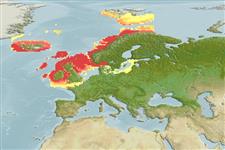>
Gadiformes (Cods) >
Gadidae (Cods and haddocks)
Etymology: Trisopterus: Greek, tris = thrice + Greek, pteron = wing, fin (Ref. 45335).
Eponymy: Lauritz Martin Esmark (1806–1884) was a Norwegian zoologist. [...] (Ref. 128868), visit book page.
Environment: milieu / climate zone / depth range / distribution range
ນິເວດວິທະຍາ
ສັດທະເລ ກ່ຽວກັບ (ຢູ່)ເທິງຊັ້ນພື້ນດິນໃນທະເລເປີດ; ປາທີ່ມີການເຄື່ອນຍ້າຍໃນສະເພາະມາະຫາສະມຸດ (Ref. 51243); ລະດັບຄວາມເລິກ 50 - 300 m (Ref. 54932), usually 100 - 200 m (Ref. 54932). Temperate; 79°N - 48°N, 27°W - 30°E (Ref. 54932)
Northeast Atlantic: southwest Barents Sea, sometimes at Bear Island, south to the English Channel, - and the Bay of Biscaye (Ref. 90172)-, around Iceland and Faeroe Islands.
Length at first maturity / ຂະໜາດ / ນ້ຳໜັກ / Age
Maturity: Lm 14.0, range 11 - 15 cm
Max length : 35.0 cm TL ຕົວຜູ້/ບໍ່ມີເພດ; (Ref. 1371); common length : 19.0 cm TL ຕົວຜູ້/ບໍ່ມີເພດ; (Ref. 4645); ອາຍຸສູງສຸດທີ່ເຄຍລາຍງານມາ: 5 ປີ (Ref. 273)
ຄີ (ໜາມ)ແຂງຢູ່ຫຼັງປາ (ທັງໝົດ) : 0; ຄີ(ໜາມ) ແຂງຢູ່ຄີກົ້ນປາ
ກຸ່ມປາກະດູກແຂງ
ຄວາມຖີ່ຂອງກຸ່ມຖ່າຍທອດພັນ
ປາທີ່ມີການເຄື່ອນຍ້າຍຈາກທະເລໄປຫານ້ຳຈືດ ແລະນ້ຳຈືດຫາທະເລ
ປາທີ່ມີການເຄື່ອນຍ້າຍຈາກທະເລແລະໄປໄຂ່ຢູ່ນ້ຳຈືດ
ຄີກົ້ນຂອງປາ
ສັດທີ່ມີກະດູກສັນຫັຼງ
ການຖ່າຍທອດທາງກຳມະພັນຈາກພໍ່ແມ່ຫາລູກ: 0. Gray-brown dorsally, silvery on sides, white on belly. A dark blotch is at the upper edge of the pectoral-fin base.
Benthopelagic to pelagic over muddy bottoms. Mostly found between 100 and 200 m. Feeds mostly on planktonic crustaceans (copepods, euphausiids, shrimps, amphipods) but also on small fish and various eggs and larvae (Ref. 1371). Caught mainly for reduction to fishmeal (Ref. 3383), trout pellets, fodder (Ref. 35388).
Oviparous, sexes are separate (Ref. 205). Migrates for spawning between the Shetland Islands and Norway and out of the Skagerrak. Major spawning grounds are Northwestern Scotland, Norway, Faeroe Islands and Iceland.
Cohen, D.M., T. Inada, T. Iwamoto and N. Scialabba, 1990. FAO species catalogue. Vol. 10. Gadiform fishes of the world (Order Gadiformes). An annotated and illustrated catalogue of cods, hakes, grenadiers and other gadiform fishes known to date. FAO Fish. Synop. 125(10). Rome: FAO. 442 p. (Ref. 1371)
IUCN Red List Status (Ref. 130435: Version 2024-1)
Threat to humans
Harmless
Human uses
ການປະມົງ: ທີ່ມີການຄ້າສູງ
ເຄື່ອງມື
Special reports
Download XML
ແຫຼ່ງອີນເຕີເນັດ
Estimates based on models
Preferred temperature (Ref.
123201): 5.9 - 10.1, mean 7.8 °C (based on 185 cells).
Phylogenetic diversity index (Ref.
82804): PD
50 = 0.5625 [Uniqueness, from 0.5 = low to 2.0 = high].
Bayesian length-weight: a=0.00603 (0.00527 - 0.00689), b=3.06 (3.02 - 3.10), in cm total length, based on LWR estimates for this species (Ref.
93245).
ຊັ້ນເຂດຮ້ອນ (Ref.
69278): 3.2 ±0.0 se; based on diet studies.
ຄວາມຢືດຢຸ່ນ (Ref.
120179): ຂະໜາດກາງ, ປະຊາກອນຕຳ່ສຸດທີ່ໃຊ້ເວລາສອງເທົ່າ 1.4 - 4.4 ປີ (K=0.36; tm=2.3; tmax=5; Fec=27,000).
Prior r = 0.50, 95% CL = 0.33 - 0.75, Based on 3 full stock assessments.
Fishing Vulnerability (Ref.
59153): Low to moderate vulnerability (32 of 100).
Climate Vulnerability (Ref.
125649): Moderate vulnerability (41 of 100).
Nutrients (Ref.
124155): Calcium = 73.1 [20.9, 258.1] mg/100g; Iron = 0.802 [0.170, 3.524] mg/100g; Protein = 17.9 [15.4, 20.0] %; Omega3 = 0.627 [0.304, 1.293] g/100g; Selenium = 17.5 [8.3, 34.9] μg/100g; VitaminA = 25.5 [6.3, 108.2] μg/100g; Zinc = 1.25 [0.31, 3.42] mg/100g (wet weight);
